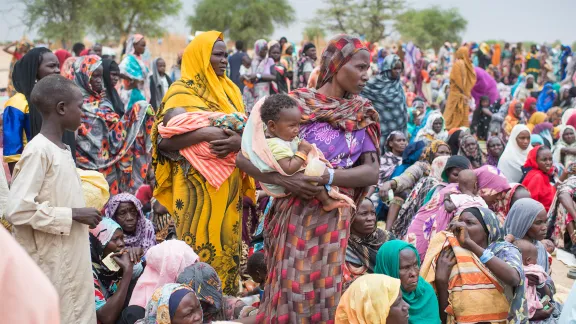Thousands have fled to neighboring countries following the fighting in Sudan. LWF country programs respond in the Sudanese border areas of Chad, Ethiopia and Sudan.

Chad. New Sudanese refugee arrivals from Sudan. Many are women with small children. Photo: UNHCR/ Colin Delfosse
Urgent need for water, sanitation, shelter and relief goods
(LWI) - The conflict in Sudan has driven tens of thousands from their homes. The Lutheran World Federation (LWF) is responding to the crisis in the Sudanese border areas of Chad, Ethiopia and South Sudan, and urgently calls for donations to support that work.
More than 100,000 people have already left Sudan for neighboring Chad, the Central African Republic, Ethiopia, Egypt and South Sudan. During the next months, UNHCR, the United Nations refugee agency, expects this number to rise to more than 800,000. In all the above countries, the Sudanese refugees arrive in communities that already host large numbers of displaced people, in countries where the humanitarian response receives little attention and even less funding. Most of the new arrivals are women and children, who are without shelter and sleeping under the open sky.
One-third of the projected number of refugees from Sudan are returnees who fled neighboring conflicts to Sudan and are now forced to move again in search of safety. 180,000 refugees from South Sudan alone are expected to their home country under difficult conditions.
Overcrowded, underfunded
“Chad already hosts 520,000 refugees, half of them in the East of the country,” says Clovis Mwambutsa, LWF Regional Program Coordinator for Central Africa. “By 3 May, there were 30,000 new refugees, and more keep coming every day. Our team has started distributing essential household items, and drilling bore holes for water where the refugees are concentrated.” LWF will also provide latrines and emergency shelter for the families, many of whom have fled with small children and could not take many belongings. The team is present in Ouaddai and Sila regions, and currently responding to the emergency in Ouaddai.
Our team has started distributing essential household items, and drilling bore holes for water where the refugees are concentrated.
Clovis MWAMBUTSA, LWF Regional Program Coordinator
In Ethiopia, Thousands have crossed into Amhara and Gambella provinces, which already host large numbers of refugees from South Sudan and have been affected by the Tigray conflict. “LWF has operations in several sites for internally displaced people (IDP) in Amhara as well as Gambella, one of the possible entry points of Sudanese refugees and returnees into Ethiopia. We stand ready to support,” says LWF Ethiopia Country Representative Sophie Gebreyes.
The same is true for South Sudan, where LWF is present in refugee sites in Ruweng and Upper Nile States and already provides education and protection services to Sudanese refugees. In collaboration with UNHCR, LWF South Sudan has since 26 April been present at the Renk border point, to assist the most vulnerable. The immediate priority is to assist newly arrived refugees, while the longer-term plan is to expand education facilities in both Jam Jang and Maban refugee camps to ensure protection and access to education for newly arrived children.
More support needed
“We urgently ask our partners to support the work in these countries”, says Allan Calma, LWF Global Humanitarian Coordinator. “We call on donors to release additional funds for this response, that repurposing or reallocating existing funds is not sufficient nor appropriate.”
“All these countries are dealing with internal conflicts and large numbers of refugees and internally displaced already. Humanitarian aid is urgently needed to provide water, food and shelter to those who have lost everything,” Calma adds.


